Recently I discovered that the HF section of a three way cabinet I have (out of four) was out to lunch. Some testing quickly revealed it was neither the amp nor the cabling. So, we cracked open the box to find some significant water damage. About 1/3 of the back of the mid driver (magnet structure) was covered in rust (it worked properly though) and there was corrosion on the crossover bi-amp/tri-amp switch. This area is nearly sealed from the one that holds the HF driver and horn (which mounts from the front) though there are vents on the sides. After pulling the grille off and extracting the HF horn/driver assembly and subsequent dis-assembly, I found the following:
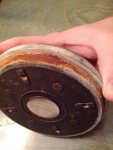
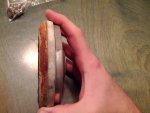
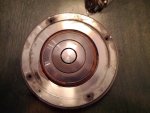
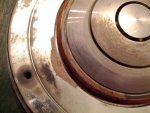
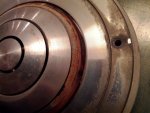
The weird thing is, the diaphragm looked nearly 100% brand new - no obvious signs of damage. However, it measured open circuit. This is not a cheap driver, and I am not a rich man, so therefore I am very saddened by this turn of events. I can barely stomach opening the other boxes.
My question is this: is this something that could be caused by condensation? All of our equipment is kept in an unheated space as we are a pretty small operation these days. We do know that these have seen some rain and wet weather, but I've never seen anything like this. I have other speakers that have been in way way worse conditions and never had any issues. Since this horn was sealed off from the rear compartment I fail to see how both could have been damaged so badly by water. I can see how the horn could have collected water if tilted up (though it never has been) but that wouldn't explain how the water got into the rear compartment. The reverse is true too. The cabinet has a rear door (bolted on with gasket) and I could see how some water could have gotten in there in a strong downpour BUT how did it make it's way into the sealed off area with the horn mouth and HF driver? The other strange thing is that the LF driver is as clean as a whistle. Cone is firm, no signs of dry rot, magnet is clean, no corrosion - it looks brand spanking new. These boxes are about 7-8 years old of which we've owned them for 6-7 years.
This is why I fear condensation...





The weird thing is, the diaphragm looked nearly 100% brand new - no obvious signs of damage. However, it measured open circuit. This is not a cheap driver, and I am not a rich man, so therefore I am very saddened by this turn of events. I can barely stomach opening the other boxes.
My question is this: is this something that could be caused by condensation? All of our equipment is kept in an unheated space as we are a pretty small operation these days. We do know that these have seen some rain and wet weather, but I've never seen anything like this. I have other speakers that have been in way way worse conditions and never had any issues. Since this horn was sealed off from the rear compartment I fail to see how both could have been damaged so badly by water. I can see how the horn could have collected water if tilted up (though it never has been) but that wouldn't explain how the water got into the rear compartment. The reverse is true too. The cabinet has a rear door (bolted on with gasket) and I could see how some water could have gotten in there in a strong downpour BUT how did it make it's way into the sealed off area with the horn mouth and HF driver? The other strange thing is that the LF driver is as clean as a whistle. Cone is firm, no signs of dry rot, magnet is clean, no corrosion - it looks brand spanking new. These boxes are about 7-8 years old of which we've owned them for 6-7 years.
This is why I fear condensation...
